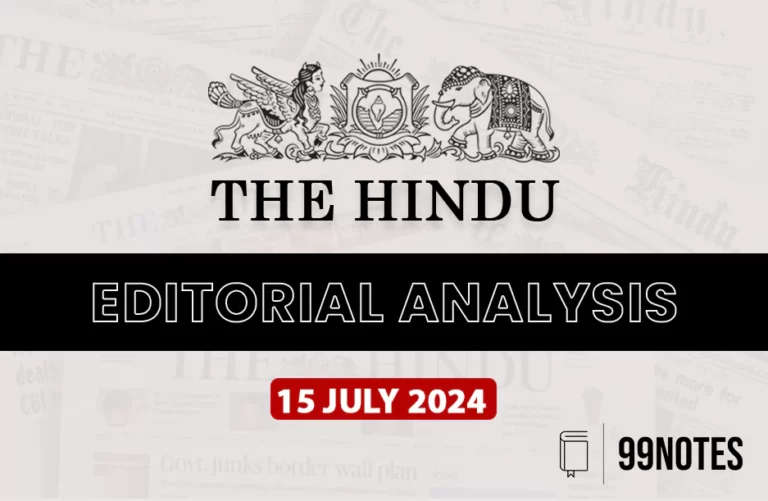31 August 2024 : The Hindu Editorial Analysis
1. The collapse of categories and post-individualism
(Source – The Hindu, International Edition – Page No. – 6)
| Topic: GS2 – Governance, GS2 – Social Justice. |
| Context |
|
Introduction:
- Categorisation is fundamental to governance and politics, affecting people, places, events, and human activities.
- The 2024 Paris Olympics showcased both the rigidity and fluidity of categories.
- Indian wrestler Vinesh Phogat was disqualified for being overweight by 100 grams, a decision widely accepted.
- Algerian boxer Imane Khelif faced challenges over her sex, which led to controversies and disqualification in 2023.
Contested Categories: Weight vs. Sex
- Phogat’s disqualification due to overweight was accepted as objective.
- Khelif’s sex was questioned despite her passport and birth assignment stating she was female.
- While weight is an objective fact, sex has become a subject of debate.
- Methods used to determine sex, such as chromosomes and hormone levels, have been challenged.
- Sex, though biological, is increasingly seen as alterable, especially in light of gender identity discussions.
Fluidity in Governance:
- Throughout history, fluid categories like citizenship, crime, and politics have been sources of conflict.
- Today’s political issues include questions about ethnicity (e.g., Kamala Harris) and caste classifications in India.
- Modernity embraced individualism, separating individuals from community-based norms, and prioritising atomised individualism.
- The individual, once viewed as indivisible, is now challenged by the fluidity of sex and gender.
Sex as a Point of Agreement:
- Historically, sex categories (male and female) were universally agreed upon across faiths, political ideologies, and science.
- British biologist Richard Dawkins argued that sex categories are a rare exception to the fluidity of the natural world.
- He stated that procreation relies on the union of male and female, with intersex individuals being exceptions.
New Idea of Sex as Choice:
- The concept of sex as choice, guided by gender perception, challenges traditional views.
- According to the Canadian Institutes of Health Research, sex refers to biological attributes, while gender relates to socially constructed roles and identities.
- Sex is biological; gender is how one feels, leading to contentious questions about gender-affirming care and the age of consent.
- This debate is central to current U.S. political discourse.
Individualism and Body-Mind Relationship:
- Historically, individualism emphasised the inviolability of both the body and the mind.
- The body was considered sacrosanct, with medical interventions aimed at restoring, not altering it.
- Gender-affirming care changes this body-mind relationship, suggesting that the body should align with the fluidity of the mind.
- This idea challenges the longest-held belief that male and female identities are permanent.
Science and Evidence in Gender Debate:
- Both proponents and opponents of gender-affirming care use science and data to support their arguments.
- Modern technology enforces categories but also allows individuals to defy them.
- Science is not only about discovering reality but also creating new realities.
- Technological advances shift medical interventions from being restorative to transformative, possibly leading to sex following gender as a matter of personal choice.
Conclusion:
- Gender ideology has created a divide in the U.S. and the West, with one side holding onto traditional views and the other dismantling the notion of the inviolable individual.
- The debate on gender and sex reflects deeper societal questions about identity, governance, and the role of technology in shaping the future.
| Practice Question: Discuss the challenges posed by the fluidity of categories like sex and gender in governance and politics, with reference to recent global events. (150 Words /10 marks) |
2. A game plan for India’s success as 2036 Olympic host
| Topic: GS2 – Governance |
(Source – The Hindu, International Edition – Page No. – 6)
| Context |
|
India’s Olympic Dream for 2036:
- In his 2024 Independence Day speech, Prime Minister Narendra Modi announced India’s ambition to host the 2036 Olympic Games.
- Although India has never hosted the Olympics and lacks world-class infrastructure, its growing sporting prowess makes the goal plausible.
- India’s success in the bid will depend on building both domestic and international consensus.
Olympic Host Selection Process:
- Hosting the Olympics requires extensive preparation and infrastructure development, as witnessed during Paris 2024.
- Since 2019, the International Olympic Committee (IOC) has reformed the host city selection process due to corruption allegations in the past (Rio 2016, Tokyo 2020).
- A confidential dialogue process led by the Future Host Commission (FHC) evaluates the feasibility, environmental concerns, and human rights standards of contender cities.
- The final election to decide the host for the 2036 Olympics is expected to take place in 2026.
India’s Sports Development Initiatives:
- India’s journey toward hosting the Olympics gained momentum after successfully organising the 2010 Commonwealth Games in New Delhi.
- The government introduced the National Sports Development Code to reform sports associations and launched the Khelo India Scheme in 2017 to improve grassroots-level sports infrastructure.
- The Khelo India Rising Talent Identification programme focuses on nurturing talented athletes between the ages of 9-18.
- At the Paris Olympics, 28 Indian athletes participating were identified under the Khelo India scheme.
Sports Infrastructure in Indian States:
- Sports as a state subject: Sports fall under the State List of the Indian Constitution, making it a state responsibility.
- Tamil Nadu leads in terms of sports infrastructure and has plans for a Global Sports City near Chennai, which will include international-standard facilities like stadiums, athletic tracks, and a velodrome.
- Tamil Nadu has also made strides in beach sports, hosting international events such as surfing and beach volleyball.
- Odisha and Delhi follow Tamil Nadu in terms of Olympic-standard infrastructure, and Odisha recently hosted the FIH Hockey World Cup 2023.
Leveraging Existing Infrastructure:
- One of the biggest challenges in organising the Olympics is the cost of building new infrastructure.
- Paris 2024 minimised costs by capitalising on existing venues, a model India could follow to reduce its expenditure.
- States like Tamil Nadu, Delhi, and Odisha, which already have significant infrastructure, can help India make a cost-effective and eco-friendly bid for the 2036 Games.
Collaborative Approach to India’s Olympic Bid:
- To achieve the goal of hosting the 2036 Olympics, India must bring together various stakeholders across political and territorial lines.
- Leadership from the Union Government is critical, and a multi-stakeholder, representative committee should be formed to oversee the planning and execution of India’s Olympic bid.
- States with existing infrastructure should be included in the process, and the proposal must align with the criteria set by the FHC.
- A collaborative approach will be essential for India’s Olympic bid to succeed and reflect the country’s true potential on the global stage.
| Practice Question: Discuss the feasibility of India hosting the 2036 Olympic Games in light of its existing sports infrastructure, government initiatives, and the challenges involved. (250 Words /15 marks) |



